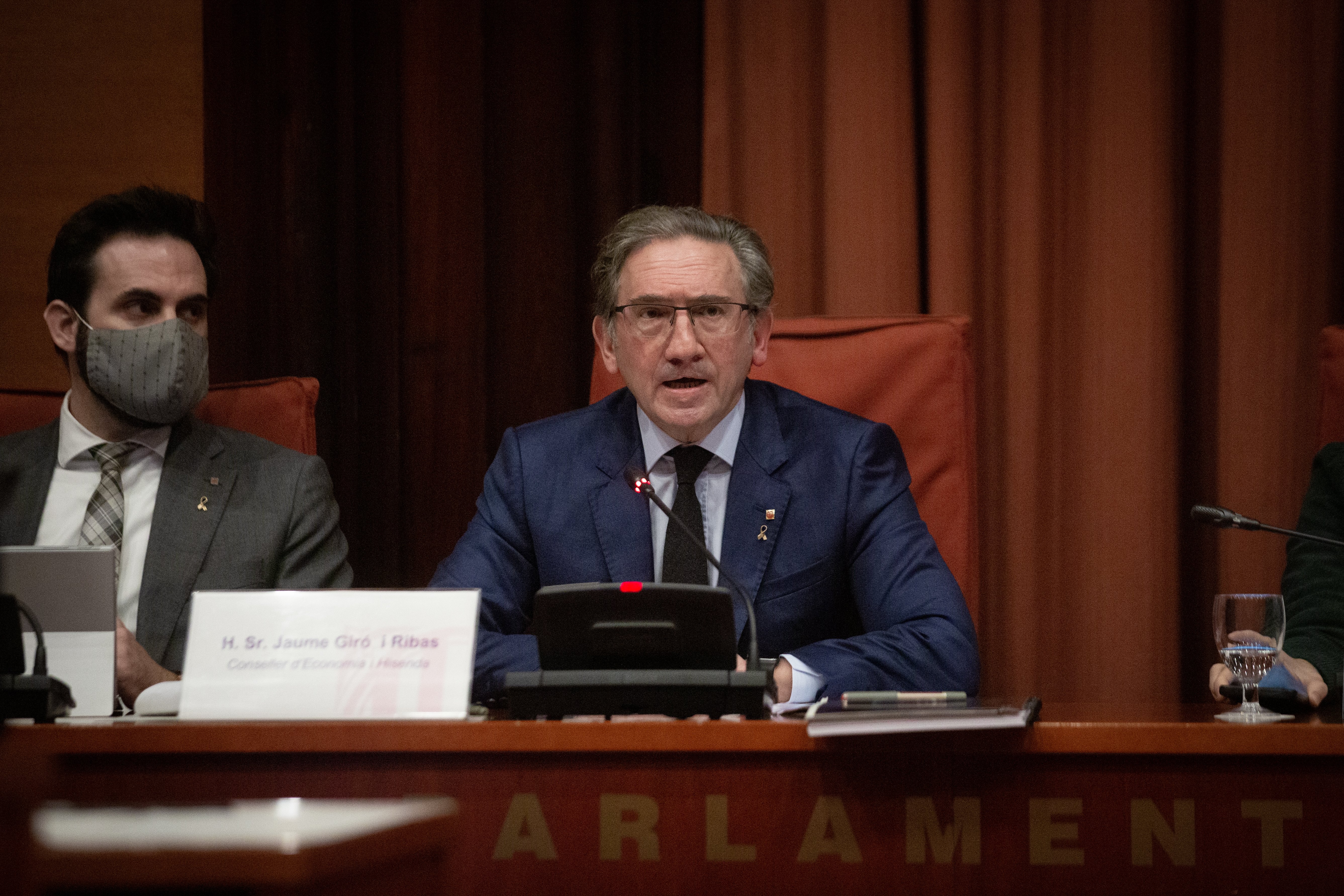The Catalan minister for finance and economy, Jaume Giró, has today appealed to the different parliamentary groups "not to hinder" the entry into parliament of the Catalan government's budget for 2022. The minister recalled that this year there was no new budget in Catalonia due to the timing - with elections in February and a government not formed until May - and he reiterated that these new proposed accounts presented last week are better than a further extension of the 2020 budget. He recalled that the country “cannot permit itself any delay” in this matter.
Speaking about the strictly economic aspects of the budget, Giró assured, during his speech to the parliamentary economy committee, that the draft about to be introduced to parliament is the "best possible budget" that the government could present and added that, in his opinion, "it is a good budget" and that Catalonia needs it. He also repeated his message from last week, "a budget, come what may", as he believes that a set of accounts have been created that seek to respond to the social and economic sensibilities of Catalans.
The CUP warns that it will take a stand
After the minister's speech, it was the turn of the opposition and the parties that support the government - with one exception: Vox, which did not even attend the committee meeting.
One of the most interesting points was the dialectic between the left-wing CUP, a priority partner for the government, and the minister himself, who was warned that the anti-capitalist party would not give in on its budget demands. The CUP spokesperson was Eulàlia Reguant, who began by recalling that economic policy is not just a question of numbers and emphasized that the most important thing is how the budget is executed, as it determines the real politics involved and who the public policies are aimed at.
Reguant also criticized that the budget presented is not very socially expansive and that presenting them as if they were "is a trick" because, according to the CUP, the accounts would be expansive if they promoted new policies. At the same time, she asserted that, in relation to one of Giró's selling points, "you would expect that 3 out of every 4 euros would go to social spending", recalling that it is the same proportion as the last budget and that in this sense nothing has been improved.
There was also discussion on the arrival of the Next Generation funds, about which she said that the "triumphalist discourse" of the institutions was concerning and pointed out that Catalonia's proportion of the Spanish funding total was completely insufficient, to which the minister recalled that he had never taken a triumphalist approach, quite the opposite in fact, saying that he had let it be known that it is correct that Catalonia will receive less than it deserves. The CUP deputy also criticized that the conditions imposed for reception of the European funds may have negative effect on people's lives, such as the extension of the period on which pensions are to be calculated.
The Socialists, still offering help to pass the budget
The leader of the opposition, the PSC's Salvador Illa, agreed with Giró that Catalonia needs a new budget and, once again, offered to negotiate them with the Catalan executive, stating that his party would be "responsible", and commenting that Catalonia "must be careful' in going out to the markets to raise funds for the future, as public debt is still high.
The parties of the unionist right that were present, the PP and Cs, chorused the suggestion that the minister should look for alternative partners to the CUP for his support on the budget, and warned that Catalonia and its economy could not be sustained much longer if they continue to put together budgets designed to seduce the far left. In fact, Alejandro Fernández (PP) predicted that there was a time limit for Catalonia's acceptance of policies agreed with the CUP and that this was 10 years.
For their part, left-wing non-independence group En Comú Podem affirmed that the budget "could be improved" and that it could only happen through the incorporation of the maximum number of views and social demands, while agreeing with Reguant's belittling of the significance of 75% of the budget being destined to social policies.
For his part, the representative of government partner Junts, Jordi Munell, emphasized the importance of public investment to stimulate the economy and emphasized that Catalonia generates 52 billion euros in taxes which the Spanish state collects and that "they only return 35 billion euros."
ERC deputy Lluís Salvadó emphasized the importance of the announced expansion of staff in public bodies "to maintain the health system, education and security" and said that it was a measure that was absolutely necessary.
Economy ministry to reduce own budget
Beyond the purely political debate, Giró also noted the specific budget of his own department, which will be the only one that will reduce its spending for 2022. During his speech he presented the five main objectives to which his own ministry's budget will be allocated: the sustainability of public finances, efficiency and economic effectiveness, the transformation and economic recovery of Catalonia, the Catalan public treasury and the improvement of corporate dissemination.
With regard to financing, the minister recalled that the Catalan government's public debt will be reduced by more than 2 points compared to GDP, and that throughout the legislature the government would fight to return to the markets to seek financing and would do everything possible to pay its suppliers within 30 days.
Finally, the point that Giró emphasized most with regard to economic efficiency was the need to "seed a culture of evaluation of public programnes", especially if they are new or considered as innovations. In this sense, he cited the Universal Basic Income initiative as an example and said that such initiatives "only make sense if they are accompanied by a comprehensive and rigorous plan".

